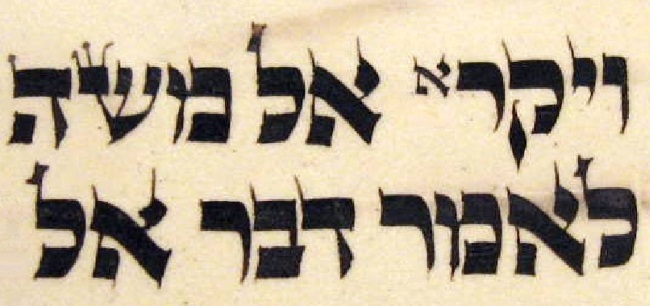
(א) וַיִּקְרָ֖א אֶל־מֹשֶׁ֑ה וַיְדַבֵּ֤ר יי אֵלָ֔יו מֵאֹ֥הֶל מוֹעֵ֖ד לֵאמֹֽר׃ (ב) דַּבֵּ֞ר אֶל־בְּנֵ֤י יִשְׂרָאֵל֙ וְאָמַרְתָּ֣ אֲלֵהֶ֔ם אָדָ֗ם כִּֽי־יַקְרִ֥יב מִכֶּ֛ם קׇרְבָּ֖ן לַֽיי מִן־הַבְּהֵמָ֗ה מִן־הַבָּקָר֙ וּמִן־הַצֹּ֔אן תַּקְרִ֖יבוּ אֶת־קׇרְבַּנְכֶֽם׃
(ט) וַיִּקְרָ֛א יי אֱלֹקִ֖ים אֶל־הָֽאָדָ֑ם וַיֹּ֥אמֶר ל֖וֹ אַיֶּֽכָּה׃
(ד) וַיַּ֥רְא יי כִּ֣י סָ֣ר לִרְא֑וֹת וַיִּקְרָא֩ אֵלָ֨יו אֱלֹקִ֜ים מִתּ֣וֹךְ הַסְּנֶ֗ה וַיֹּ֛אמֶר מֹשֶׁ֥ה מֹשֶׁ֖ה וַיֹּ֥אמֶר הִנֵּֽנִי׃
(ד) וַיִּקָּ֥ר אֱלֹקִ֖ים אֶל־בִּלְעָ֑ם וַיֹּ֣אמֶר אֵלָ֗יו אֶת־שִׁבְעַ֤ת הַֽמִּזְבְּחֹת֙ עָרַ֔כְתִּי וָאַ֛עַל פָּ֥ר וָאַ֖יִל בַּמִּזְבֵּֽחַ׃
א' דויקרא זעירא, שמשה לא רצה לכתוב אלא ויקר, כדרך שנא' בבלעם כאלו לא נראה לו השם אלא במקרה. ואמר לו הקב''ה לכתוב גם באל''ף, וכתבה קטנה.
The Still, very Small Aleph
Baal Turim
Moses wanted to write it without an aleph to hide, the fact that G-d called him intentionally in contrast to the manner in which He called non-Jewish prophets such as Bil'am, expressing that prophecy to them was just "an accidental event". The Torah wrote "called/encountered/appeared" for them without an aleph. However, G-d ordered Moses to write it with an aleph. Moses wrote it with a small aleph.
(יג) וַיֹּ֥אמֶר מׇרְדֳּכַ֖י לְהָשִׁ֣יב אֶל־אֶסְתֵּ֑ר אַל־תְּדַמִּ֣י בְנַפְשֵׁ֔ךְ לְהִמָּלֵ֥ט בֵּית־הַמֶּ֖לֶךְ מִכׇּל־הַיְּהוּדִֽים׃ (יד) כִּ֣י אִם־הַחֲרֵ֣שׁ תַּחֲרִ֘ישִׁי֮ בָּעֵ֣ת הַזֹּאת֒ רֶ֣וַח וְהַצָּלָ֞ה יַעֲמ֤וֹד לַיְּהוּדִים֙ מִמָּק֣וֹם אַחֵ֔ר וְאַ֥תְּ וּבֵית־אָבִ֖יךְ תֹּאבֵ֑דוּ וּמִ֣י יוֹדֵ֔עַ אִם־לְעֵ֣ת כָּזֹ֔את הִגַּ֖עַתְּ לַמַּלְכֽוּת׃ (טו) וַתֹּ֥אמֶר אֶסְתֵּ֖ר לְהָשִׁ֥יב אֶֽל־מׇרְדֳּכָֽי׃ (טז) לֵךְ֩ כְּנ֨וֹס אֶת־כׇּל־הַיְּהוּדִ֜ים הַֽנִּמְצְאִ֣ים בְּשׁוּשָׁ֗ן וְצ֣וּמוּ עָ֠לַ֠י וְאַל־תֹּאכְל֨וּ וְאַל־תִּשְׁתּ֜וּ שְׁלֹ֤שֶׁת יָמִים֙ לַ֣יְלָה וָי֔וֹם גַּם־אֲנִ֥י וְנַעֲרֹתַ֖י אָצ֣וּם כֵּ֑ן וּבְכֵ֞ן אָב֤וֹא אֶל־הַמֶּ֙לֶךְ֙ אֲשֶׁ֣ר לֹֽא־כַדָּ֔ת וְכַאֲשֶׁ֥ר אָבַ֖דְתִּי אָבָֽדְתִּי׃ (יז) וַֽיַּעֲבֹ֖ר מׇרְדֳּכָ֑י וַיַּ֕עַשׂ כְּכֹ֛ל אֲשֶׁר־צִוְּתָ֥ה עָלָ֖יו אֶסְתֵּֽר׃ {ס}
(א) וַיְהִ֣י ׀ בַּיּ֣וֹם הַשְּׁלִישִׁ֗י וַתִּלְבַּ֤שׁ אֶסְתֵּר֙ מַלְכ֔וּת וַֽתַּעֲמֹ֞ד בַּחֲצַ֤ר בֵּית־הַמֶּ֙לֶךְ֙ הַפְּנִימִ֔ית נֹ֖כַח בֵּ֣ית הַמֶּ֑לֶךְ וְ֠הַמֶּ֠לֶךְ יוֹשֵׁ֞ב עַל־כִּסֵּ֤א מַלְכוּתוֹ֙ בְּבֵ֣ית הַמַּלְכ֔וּת נֹ֖כַח פֶּ֥תַח הַבָּֽיִת׃
(טז) לַיְּהוּדִ֕ים הָֽיְתָ֥ה אוֹרָ֖ה וְשִׂמְחָ֑ה וְשָׂשֹׂ֖ן וִיקָֽר׃
(כז) וְאִ֨ם־בְּזֹ֔את לֹ֥א תִשְׁמְע֖וּ לִ֑י וַהֲלַכְתֶּ֥ם עִמִּ֖י בְּקֶֽרִי׃ (כח) וְהָלַכְתִּ֥י עִמָּכֶ֖ם בַּחֲמַת־קֶ֑רִי וְיִסַּרְתִּ֤י אֶתְכֶם֙ אַף־אָ֔נִי שֶׁ֖בַע עַל־חַטֹּאתֵיכֶֽם׃
Rabbi Jonathan Sacks: Spiritual Attunement
https://www.rabbisacks.org/covenant-conversation/vayikra/between-destiny-and-chance/
When Scripture says, “If you continue to be keri towards Me, then in My anger I will be keri towards you”, it means: If, when I bring trouble upon you in order to cause you to repent, you say that the trouble is purely accidental, then I will add to your trouble the suffering of being left-to-chance. Mishneh Torah, Taaniyot, 1:1-3
Rambam understands keri to be related to the word mikreh, meaning “chance”. The curses, in his interpretation, are not Divine retribution as such. It will not be God who makes Israel suffer: it will be other human beings. What will happen is simply that God will withdraw His protection. Israel will have to face the world alone, without the sheltering presence of God.
This, for Rambam, is simple, inescapable measure-for-measure (middah kenegged middah). If Israel believe in Divine Providence, they will be blessed by Divine Providence. If they see history as mere chance – what Joseph Heller, author of Catch-22, called “a trashbag of random coincidences blown open by the wind” – then indeed they will be left to chance . . .
The difference between mikra and mikreh – between history as God’s call and history as one event after another with no underlying purpose or meaning – is, in the Hebrew language, almost imperceptible. The words sound the same. The only difference is that the former has an aleph while the latter does not.
The letter aleph is almost inaudible. Its appearance in a sefer Torah at the beginning of Vayikra (the “small aleph“) is almost invisible. Do not expect – the Torah is intimating – that the presence of God in history will always be as clear and unambiguous as it was during the Exodus from Egypt and the division of the Red Sea. For much of the time it will depend on your own sensitivity. For those who look, it will be visible. For those who listen, it can be heard. But first you have to look and listen. If you choose not to see or hear, then Vayikra will become Vayikar. The call will be inaudible. History will seem mere chance.
Viktor Frankl, ‘The Unconscious God’, Simon & Schuster, New York, 1975, 11.
But in the darkness, I had acquired a sense of my own unique mission in the world. I knew then, as I know now, that I must have been preserved for some reason, however small; it is something that only I can do, and it is vitally important that I do it… In the solitary darkness of the “pit” where men had abandoned me, He was there. When I did not know His name, He was there; God was there.
Me’or Eynayim [Menachem Nachum of Chernobyl, c. 1730-1797, major Chasidic work edited by his student Eliyahu and arranged according to the weekly Torah portion and holidays]
God is present in reduced form within every one of us. Even the most wicked person contains God’s presence. This is seen in the fact that every sinner has flashes of conscience. This is God calling us and saying, “Return to Me!” But the person just doesn’t understand that this is the Blessed Holy One calling out to [her]. That is why Vayikra – He called – is written with a miniature aleph. God the cosmic aleph is present in miniature form within each person, calling us to return. These are our pangs of conscience, but we do not perceive them as God’s own call to us. That is why Vayikra – He called – is written anonymously in our verse. But when the person understands that this is the voice of God and turns back toward the Creator, then Vayedaber Adonai elav – “Hashem spoke to him from the Tent of Meeting.




